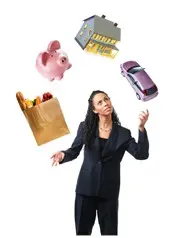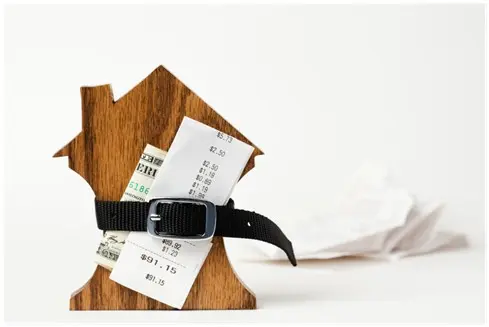- Create a personal budget to manage your monthly cash flow.
- Learn about paying off credit cards and student loans.
- Explore debt relief options.
How can I solve my student loan and credit card debt problems?
I have a large amount of private student loans that are starting to come to payment (can no longer be deferred or forbearance) and a lot of credit card debt. What are my best options to pursue? I don't make enough money to pay current payments on both (currently paying minimum payments on credit cards). Would debt settlement be the best option? Is there somewhere I can consolidate my student loans and credit cards together?
Thank you for your question about credit card debt, private student loans and solutions for debt relief, including loan consolidation.
It is wise of you to look for a comprehensive debt relief solution that will deal with your overall debt. It is crucial to your financial health that you deal with the problem of making minimum credit card payments and required private student loan payments.
To best deal with your situation, let’s examine the following topics:
- Creating a personal budget and looking at your overall financial picture
- Student loan repayment options
- Credit card repayment options
- Debt Relief options
Bills.com has many resources about those subjects. I will give you a guideline regarding the various topics and point you to Bills.com articles with more detailed information.
Create a personal budget
To get control of your debt, it is vital that you know your cash flow, what is coming in and what goes out. Your first step is
to create a personal budget. Bills.com has a great personal budget resource. It helps you understand the major components of a budget, and the steps to follow to create one.

Your personal budget is a great tool that will help you understand where your finances stand at the end of each month. You will be able to see what expenses are less flexible and what expenses can be cut.
A major part of your monthly expense is going to paying off debt, including private student loans and credit card debt. By creating a budget, you will know exactly to whom you are paying and how much. Pay special attention to these ratios, so you can monitor them and improve them:
- Housing debt (or rent) to Income ratio
- Total debt to Income ratio
- Unsecured debt to Income ratio
The aim of the personal budget tool is to help you get control of your finances, so your cash flow is working to build equity and pay off debts.
Budgeting is hard. Achieve MoLO™ makes it easy.
The simple and free money management app connects accounts and tracks your money left over for you so you’re in control of spending and saving.
Learn moreCheck out student loan repayment options
You mention having a lot of private student loans coming due, after you used your deferment and forbearance periods. Here are the steps to take:
- Chart out your loans: Make a chart of all of your student loans, separating the federals student loans from the private student loans. List the important data, including the following:
- Federal Student Loans: check if you are eligible for any special programs. The government has payment programs based on your income, IBR (Income based payment) and ICR (Income contingent repayment). Also, if you think that you can extend the payment schedule significantly, then consider consolidating your federal loans.
- Private Student Loans:
- Loan Modification: You can speak with your lender and attempt to modify the terms of the loan. However, lenders do not generally do this and you will need the consent of any cosigner on your loan.
- Private Student Loan Consolidation or Refinance: This is really your first option to deal with your private student loans. Private Student Loan Consolidation can sometimes aid by lengthening the period of the loan and thereby reduce the monthly payment. You will have to prequalify for the student consolidation loan, and if you do not have sufficient credit history, credit score, or income, then you may have to add a cosigner.
- Default: If you cannot meet your obligations, and cannot change the terms of your loans to affordable ones, then you will be facing default on your private student loans. I will discuss this in the debt relief section below.
Not just student loans - don't forget your credit card payments
Bills.com has many resources and tools to help you with your credit card debt. Once you understand your monthly cash flow, and your net worth position, then you can more easily look for a solution. It may be the case that you can help solve your student loan problems by finding a cheaper way to pay off your credit card debt.
Monitor your credit report: Check your credit report, and see that all of your cards are correctly reported. Check that you have correctly entered all the credit accounts on your personal budget report.
Free credit score
Concerned about what is appearing on your credit report now? Check your credit report today and get in a free credit score instantly.
Look for best payment strategies: Making only minimum credit card payment is the worst strategy for paying off credit cards, as you stretch out the payments for an extremely long time. Check out and use the Bills.com minimum payment calculator. Always aim to pay more than the minimum credit card payment, and add the extra amounts either to the card with the largest interest rate (to save money) or the least balance (to clear out one of your creditors). These two payment strategies, using funds above your mandatory minimum payment amount, are the snowball and avalanche payment strategies. They are explained in the Bills.com article debt-snowball.
Loan Consolidation — Using other assets as solutions: If you cannot make the minimum payments, then you will need to look for other ways to deal with your debt problems. If you have equity in assets then you can consider either selling the assets or refinancing.
Many people look for short-term solutions, such as payday loans and cashing out their 401k retirement accounts. I do not recommend using these, except in extraordinary circumstances. In general, a payday loan is a temporary stopgap measure and just builds up more short-term pressure. Using funds in a 401k or other retirement account is generally a costly manner of paying down loan, as it usually involves taxes and penalties. In addition, retirement accounts are generally protected accounts in cases of collection and bankruptcy. Because they are usually beyond the reach of creditors, using them to pay of creditors should be an option of last resort.
Default: If you cannot meet your obligations, and cannot change the terms of your loans to affordable ones, then you will be facing default. I will discuss this in the debt relief section below.
Default on credit cards and private student loans
Both credit card debt and private student loans are unsecured debt. Each has different statute of limitations and collection laws that will vary from state to state. (Note: Federal student loans have different collection rules than private student loans. There is is no statute of limitation on federal student loans, they are not dischargeable in a bankruptcy, and wage garnishments are possible without any court hearing or lawsuit).
Once you stop making required payments on your private student loans or less than the minimum credit card payment, you are in danger of default. In general, once you default you can expect the collection process to kick in. You can expect the following steps, from either your creditor or a collection agency, if you default:
- Collection calls and letters: Do not ignore them, because timely action can prevent problems.
- Court Judgments: Make sure that you are prepared, if necessary, to make an appropriate defense or protection of asset.
- Wage garnishments, bank levies, and liens on personal property: If a court judgment is ruled against you then your assets and income are likely to be taken.
For more information, read these Bills.com article about collection and judgments:
Debt Settlement - Reduce your debts
Debt settlement looks right to you? Contact one of Bills.com’s pre-screened debt providers for a free debt relief quote.
Start nowNeed help? Check out debt relief options
You have taken a big step toward finding a solution by:
- Preparing your personal budget and net worth statement
- Preparing your private student loan details
- Preparing your credit card details
- Attempting to do a private student loan consolidation
- Trying to make more than minimum credit card payments.
Once you have determined that you cannot make the minimum payments on your private student loans and your credit card debt, and you are in danger of defaulting, immediately start working on a debt relief solution.
One possibility, which you refer to, is loan consolidation. Loan consolidation is generally a secured loan that has an asset as security for the loan. No lender, who is offering market terms, will offer a large unsecured loan to cover debt that you can not manage to pay currently. This is not a likely solution.
Oftentimes the term credit card consolidation refers to various debt relief solutions. Your major solutions are:
- Credit Counseling
- Debt Settlement (Debt Negotiation
- Bankruptcy (Chapter 13 or Chapter 7)
Read the Bills.com article about debt relief to learn more about each of those solutions.
Although in the past, private student loan lenders were reluctant to do a debt settlement, today, Bills.com has heard that some lenders are beginning to explore that possibility. In addition, by dealing with your credit card debt, you will eventually free up funds that can be used for a solution for your student loan debt.

I am not familiar with American Student Loans. It sounds like a private student loan lender, but I don't know for sure. Assuming that it is a federal student loan, once you rehabilitate it and are making payments as agreed, your refund should not be at risk. If you are making payments without formally having rehabilitated your loan, I believe that your refund would still be at risk, despite your making monthly payments.